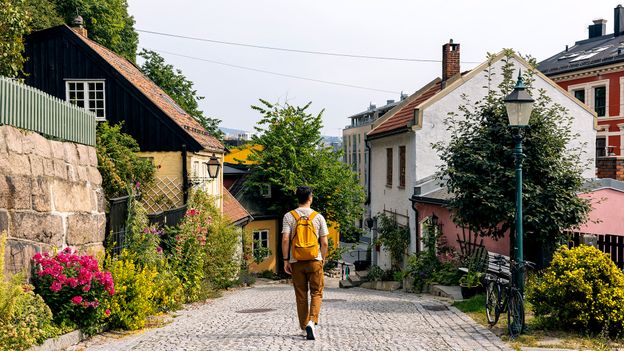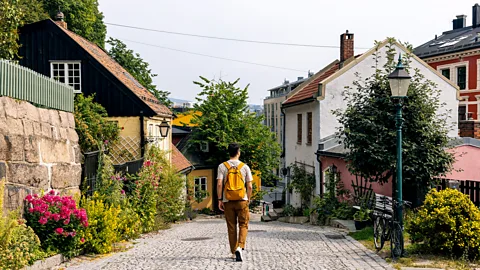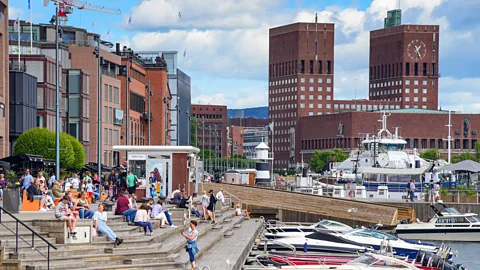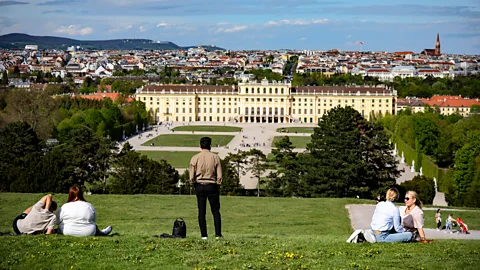How a viral ad campaign is teaching us to ‘life-see’, not sightsee

 Getty Images
Getty ImagesIn a summer of overtourism, a viral Oslo travel advert with nearly 20 million views is turning the tables on what travellers want.
It’s hardly a traditional start to a tourism advertisement: “I wouldn’t come here to be honest,” says an unimpressed resident of Oslo.
The narrator, a 31-year-old man named Halfdan, then introduces viewers to Norway’s capital, and complains about its lack of pretension, its easily accessible art like Edvard Munch’s The Scream (“Not exactly the Mona Lisa,” he notes) and its accessibility. All the while, he strolls through a tranquil cityscape with no queues, crowds or selfie-snappers in sight.
“You can just walk from one side of town to the other in, like, 30 minutes,” Halfdan grouses. “Is it even a city?”
Since its release in late June, the one-minute and 45-second, English-language film has attracted nearly 20 million views, delighting the city’s tourism officials.
Perhaps it shouldn’t come as a surprise.
The video’s release comes as a growing group of travellers are beginning to turn away from well-worn tourist paths. No longer, it seems, do they want to join throngs of visitors to see the same landmarks and take the same pictures to show their friends on social media.
But Oslo seems to have another visitor in mind.
August Jorfald, who directed the film and wrote the script, said it was inspired by a holiday he took to Paris with his girlfriend. Before they left home, he told her he had one goal: “I said the trip would be successful if I didn’t see the Eiffel Tower.”
The Oslo native, who turns 30 this month, is not alone. Younger travellers don’t want the same vacations their parents took, he says. They’re seeking experiences not designed for tourists. “I don’t want the Disney World. I want to be at someone’s kitchen table and drink wine from a milk glass.”
 Getty Images
Getty ImagesHe said nobody’s excited about taking pictures of places like the Tower of Pisa or Iceland’s Blue Lagoon. “It’s a bit out of time. I think it’s becoming dull. People are tired of it.”
Instead, visitors want authenticity – a word, he acknowledges, that is hard to define.
But the idea is hardly new. Blogger and publicist Elena Paschinger calls the trend “life-seeing instead of sightseeing”, a phrase she used to subtitle her 2015 book The Creative Traveler’s Handbook.
Thoughtful Travel
Want to travel better? Thoughtful Travel is a series on the ways people behave while away, from ethics to etiquette and more.
In her around-the-world trips, the Austrian native has found that even routine activities like grocery shopping, taking a commuter train or visiting a park popular with local families can be appealing.
“I’ve always avoided the tourist traps and gone where the locals meet, and where the life was happening,” she said. “It was more mundane perhaps, but because it was a different culture it was very, very exciting.”
The Oslo ad seems to hit the same notes.
Researcher Lauren A Siegel, a tourism and events lecturer at the University of Greenwich in London, calls the promotion “brilliant and on-trend”, appealing to viewers who have become disenchanted with living their lives online.
She says Generation Z travellers who have grown up with social media are curious about taking trips without it. “It has been around for almost a decade now and naturally generations are shifting,” she says. “People are kind of over it.”
They have begun to realise that social media changes the travel experience, Siegel says. “It offers a glamorised and not really realistic view of a place. It creates a disconnect with the culture around you. You’re missing out. When you’re on your phone constantly, it creates a real block.”
But when holidaymakers forget about getting likes or impressing friends back home, it can change the trip. “Instead of looking down at your phone, you’re looking back up. It opens up all these great opportunities that we lost. That’s a beautiful thing,” Siegel adds.
The trend has been gaining traction for several years. In 2018, the city of Vienna tapped into so-called Instagram fatigue with a tourism campaign that urged visitors to “Unhashtag” their vacation by putting down their phone.
 Getty Images
Getty ImagesOfficials had noticed that visitors to the historic city were beginning to change, says Helena Steinhart, the Vienna Tourist Board’s international media relations manager who worked on the promotion.
“They’d come here and they’d run from one site to the next, and they pack the whole day. And then they’d want to create videos and photos and look good. It seems that they were hurried and stressed all the time, even though they were on vacation.”
The city’s solution was to urge visitors to “Enjoy Vienna. Not #Vienna”. It steered tourists to the city’s neighbourhoods, away from its famous museums and palaces.
A few weeks ago, Steinhart said a tourism colleague sent her a link to the Oslo video, noting how it echoed themes Vienna had addressed years earlier. “Maybe we were too early with it,” she said.
But she has nothing but praise for the deadpan Norwegian ad. “It’s wonderful work. Funny and nice and just very well-executed.”
Oslo, a city of just more than a million (which at times thinks of itself as the little brother to larger Scandinavian capitals like Stockholm and Copenhagen), is enjoying the video’s success, even though it comes as a surprise.
“We’re scratching our heads a little bit,” said Anne-Signe Fagereng, the director of marketing at VisitOSLO. “We were kind of unsure if the humour would really travel.”
Her theory is that the campaign hit a nerve connected to overtourism. Like other travel professionals, she has been watching how cities like Barcelona, Venice and Amsterdam struggle with their popularity and masses of visitors. Still, she’s not worried that the summer’s viral video will flood Norway’s capital city with hordes of Instagram-obsessed tourists.
“I don’t think this film is going to change things so much overnight,” she said.
Jorfald agrees. He said for now he’s happy to draw attention to his hometown.
Traditionally, most visitors to Norway stop only briefly in the city before heading out to the countryside. “You come to Oslo and then you leave, which is sad for them,” he said. “They should stay a little longer.”
Related
Turkish Airlines and Qatar Airways Suspend Mogadishu Flights Following US…
Home » Airlines News of Qatar » Turkish Airlines and Qatar Airways Suspend Mogadishu Flights Following US Embassy Terror Alert, Raising Security Concerns at
Local tourism destinations grow fast
Men sit at the Doha Corniche backdropped by high buildings in Doha on March 3, 2025. Photo by KARIM JAAFAR / AFP DOHA: Local tourism destinations are g
Hajj, Umrah service: Qatar Airways introduces off-airport check-in for pilgrims
Image credit: Supplied Qatar Airways has introduced an off-airport check-in
IAG, Qatar Airways, Riyadh Air, Turkish Airlines, Lufthansa & more…
Turkish Airlines – a Corporate Partner of the FTE Digital, Innovation & Startup Hub – is charting a course to rank among the top 3 global airlines for













